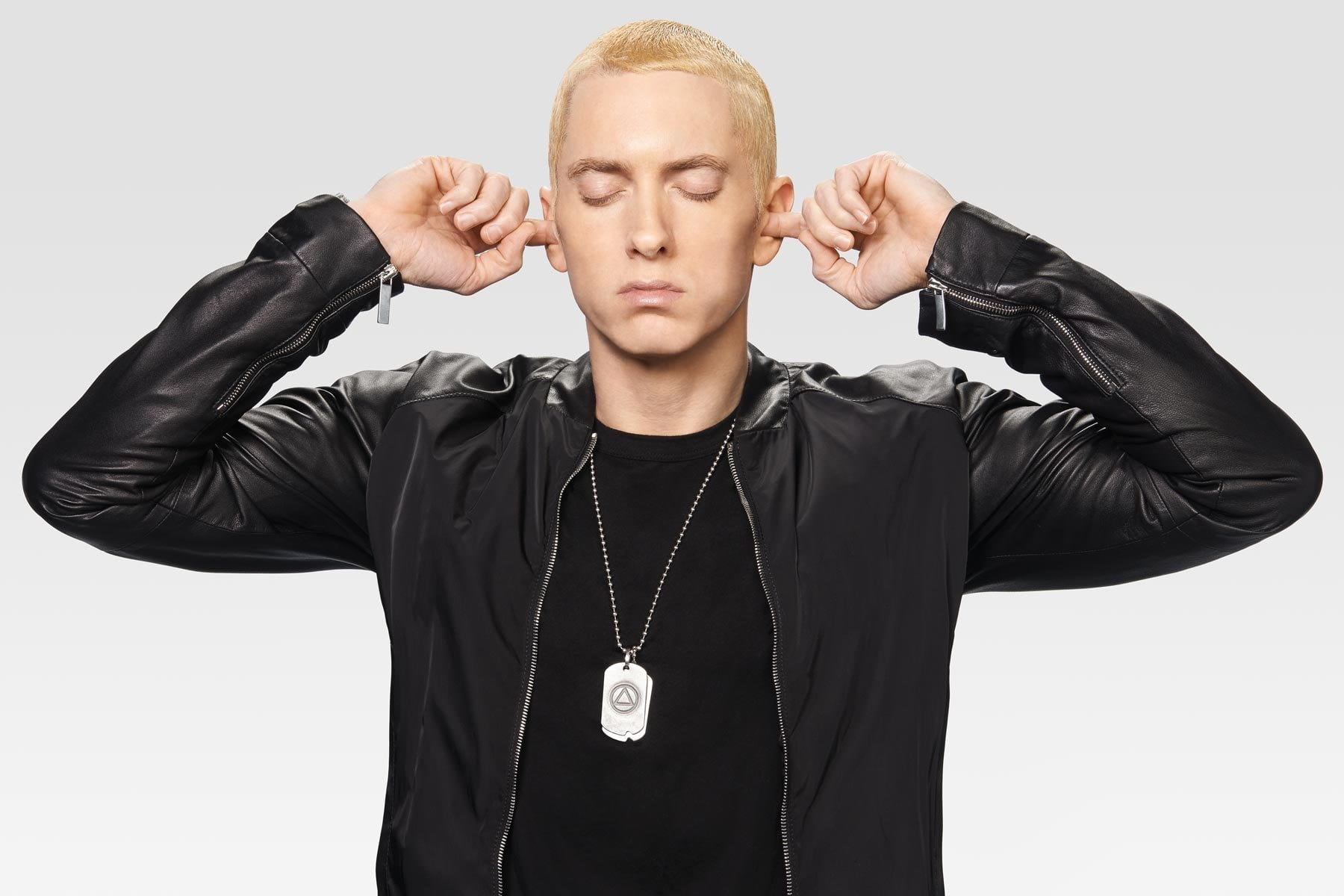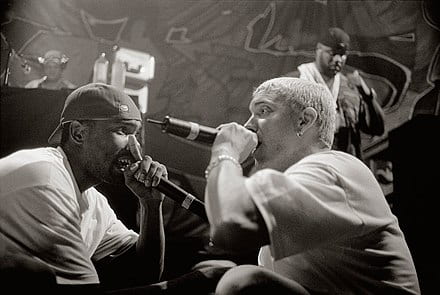
Image from WikiMedia Commons
Music changes, a lot.
Despite facing difficulties to be respected the same way as white people, in the 1950s, classic Roots of Rock artists like Chuck Berry, Ray Charles, Ella Fitzgerald and more started to wow the world by coming together and creating their own music.
And the black community loved it, elated with excitement, they finally found a way to cope with the discrimination from white people.
In the late 70s and early 2000s, they adapted their music style with a little something they called rap.
Rap is a form of music that emerged in the United States in the 1970s, particularly in African American and Afro-Caribbean communities in New York City. It is a type of hip hop music that involves the rhythmic and spoken delivery of lyrics. It is often accompanied by a beat, which may be produced using drums, percussion, electronic instruments, or samples from other songs.
One of the defining characteristics of rap is its emphasis on the spoken word. Unlike other forms of popular music, such as rock or pop, which rely heavily on melody and harmony, rap places greater importance on the rhythm, flow, and delivery of the lyrics. The lyrics are typically delivered in a spoken or semi-spoken style, often with a strong emphasis on rhyming words.
Rap lyrics can cover a wide range of topics, from personal experiences to social and political issues. Many rappers use their music to comment on issues such as racism, poverty, police brutality, and other social injustices. Some rappers use their music to tell personal stories about their own lives, while others use it to express their thoughts and feelings about the world around them.
Rap has evolved over the years, with different subgenres and styles emerging. For example, gangsta rap, which emerged in the 1980s, focuses on themes of violence, crime, and street life. Conscious rap, which emerged in the 1990s, focuses on social and political issues, with artists using their music to promote positive social change. Mumble rap, which emerged in the 2010s, is characterized by its use of unintelligible lyrics and a focus on melody rather than the lyrics themselves.
This was, like the 50s, another music style that only belonged to the black community, and people started loving it, even the white men that had an abundant amount of power over them hundreds of years ago, but the black community never expected one of those white people to use that style of music.
Well, one boy did, his name was Marshall Bruce Mathers II, who would later be known as Eminem.
Eminem grew up in horrible condition, his parents with an ongoing conflict, his family living impoverished, with an unquenchable thirst of just a little dollar bills to thrive on.
His relationship amongst his parents and his whole family was implied in one of his most recognizable songs, Mockingbird.
In Mockingbird, he portrays the little girl as him as a kid, as he almost perfectly describes how his life was, with many lyrics, a spot-on beat, and an indefinitely recognizable chorus. He is supposedly speaking to his daughter in the way his father spoke to him, reciting every unfortunate thing that occurred during his childhood.
Now, many doubts rose after hearing that there was a new hip-hop sensation emerging, a white hip-hop sensation.
He managed to fight through those critics and doubts, and instead persevered to become one of the world’s best artists, and later became better than the average hip-hop artist, who at those times, were all black.
His valiant actions led him to where he is today.

Image from WikiMedia Commons
His presence in the hip-hop community nowadays, despite ongoing controversy from black fans, has now been forgotten, and he has triumphed over most black hip-hop artists, after performing in Super Bowl LVI along with Snoop Dog and many others.
His hits vary, and with him having 66 million listeners per month on Spotify, with three of his top five songs being listened to at least 1 billion times, it’s fair to say that he is just different, and is miles above the rest.

Image from DeviantArt
Despite producing a halftime show to remember, Dr. Dre revealed he asked not to work with Eminem at the beginning, simply because he was white.
“My gut told me Eminem was the artist that I’m supposed to be working with right now. But I didn’t know how many racists I had around me. The so-called execs and what have you were all against it”.
When he was finally acknowledged by black artists

It didn’t all start out so swell for Eminem’s career. People had continuous doubts during his presence in the early 2000s, as mentioned earlier. They began to get very annoyed with him disturbing their music, emerging to a point where they felt he was taking over.
Of course, he was doing everything but.
He knew breaking the racial barriers in the world of hip-hop was always going to be a challenge, so would reinstating his confidence to do so.
But it took much more than performing. Music can change how people feel about one another, but it can’t change the disposition of one immense group towards one single person which 20 years, ago, seemed like someone completely different.
Entering the new century, black people still haven’t (and probably won’t) forgive(n) white people for all the harm they did to them in the 60s, and much earlier before, and forgiving them through one white person ‘disrupting’ their own music that they developed for decades was proving to be impossible.
But Eminem didn’t need their respect. He needed their approval, their approval to sing their words, and to vibe to their music, and to quite literally be one in a million.
Many people, including some Black artists and fans, were initially skeptical of Eminem’s authenticity and ability to represent the culture of hip hop and rap music as a white artist. Some critics argued that rap music should be the exclusive domain of Black culture, and that white artists like Eminem had no right to participate or profit from the genre.
However, Eminem’s talent and unique style quickly won over fans and critics alike. His lyrics were raw, emotional, and brutally honest, reflecting his own struggles with poverty, addiction, and family dysfunction. He also demonstrated a remarkable skill for wordplay, rhyme, and storytelling, which quickly set him apart from other rappers of his time.
Despite the initial criticism, Eminem’s popularity continued to grow, and he soon became one of the most successful and respected rappers in the world. He won multiple Grammy Awards and other accolades, and collaborated with a wide range of artists, both Black and white. He also continued to experiment with different styles and subjects, addressing everything from politics to pop culture in his music.
Over time, Eminem’s success has come to be recognized as a testament to his hard work and dedication, as well as to the support of his fans who appreciate his music regardless of his race. While he may have faced criticism and challenges early on, his talent and passion for the genre have helped him to become one of the most influential and important rappers of all time.
Of course, Eminem’s success has also raised important questions and debates about race and cultural appropriation in the music industry. Some critics argue that white artists like Eminem have profited from Black culture without acknowledging or respecting its roots and history. Others argue that Eminem’s success is a reflection of the changing demographics and attitudes of rap music fans, and that race is becoming less of a factor in determining who can participate in the genre.
Regardless of these debates, it is clear that Eminem’s success as a rapper is a testament to his talent, hard work, and perseverance. His ability to overcome the initial criticism and skepticism of his race speaks to the power and universality of hip hop and rap music, which continue to evolve and thrive as a global cultural phenomenon.

His most notable achievements consist of:
- Grammy Awards: Eminem has won 15 Grammy Awards, including Best Rap Album for “The Slim Shady LP,” “The Marshall Mathers LP,” and “The Eminem Show.”
- Academy Awards: Eminem won an Academy Award for Best Original Song for “Lose Yourself,” which was featured in the film “8 Mile.”
- MTV Video Music Awards: Eminem has won multiple MTV Video Music Awards, including Best Rap Video for “The Real Slim Shady” and “Without Me.”
- Billboard Music Awards: Eminem has won numerous Billboard Music Awards, including Top Artist, Top Male Artist, and Top Rap Artist.
- American Music Awards: Eminem has won several American Music Awards, including Favorite Rap/Hip-Hop Artist and Favorite Rap/Hip-Hop Album.
- BET Hip Hop Awards: Eminem has won several BET Hip Hop Awards, including Best Live Performer, Lyricist of the Year, and Best Hip Hop Video.
- People’s Choice Awards: Eminem has won multiple People’s Choice Awards, including Favorite Hip-Hop Artist and Favorite Male Musical Performer.
- UK Music Video Awards: Eminem has won several UK Music Video Awards, including Best International Urban Video and Best Editing in a Video.